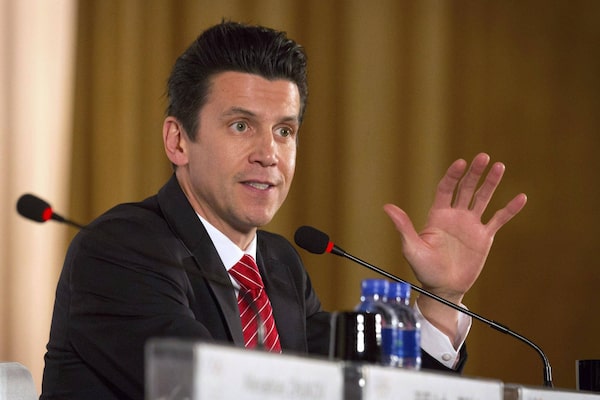
IOC executive director Christophe Dubi, seen during a news conference in Beijing in March, 2015, has said the organization is willing to make changes to create incentives for prospective host cities, such as Calgary, amid waining interest.Mark Schiefelbein/The Associated Press
The International Olympic Committee is willing to relax its standards related to everything from spectator-capacity requirements to security plans in an effort to lure potential host cities to bid for Summer and Winter Games, according to the IOC's executive director.
Christophe Dubi said the global organization is confident Olympic costs can drop – a step necessary to convince skeptical cities to jump into auctions for the Games.
Calgary is mulling bidding for the 2026 Winter Olympics and a handful of IOC officials are in the city, speaking with politicians and bureaucrats. Dubi, who was not in Calgary, spoke with the city's mayor, Naheed Nenshi, on the telephone.
Calgary has until March to declare whether to participate in the bidding process for the 2026 Olympics. The debate at city hall centres on money – and the IOC's sincerity regarding its flexibility around financial reforms.
While Dubi refused to say whether the IOC would increase its $925-million (U.S.) contribution to the host city, he did provide a list of concessions the IOC can make.
"I'm certain that with the flexibility that we provide now, especially with the venues … that [it] will have a positive impact on the operating budget," Dubi told reporters on a conference call on Wednesday after he spoke with Nenshi. "We should see the result in the bottom [line] of budgets that candidate cities will provide to us in a matter of months."
The IOC will no longer dictate minimum spectator capacity at venues, Dubi said as an example. The size of the areas around venues will also be flexible. Security checks with magnetic wands and bag searches could be redesigned, he said. "You cut one mag-and-bag, you cut energy, you cut technology," he said.
The downside of shrinking capacity for events, however, is less ticket revenue.
Calgary's now-disbanded bid-exploration committee estimated last year it would cost $4.6-billion (Canadian) to hold the Games, and that would come with a deficit. City bureaucrats have since taken over the process and in one scenario, which they accidentally made public, costs could rise to $5.1-billion.
City organizing committees can now shift responsibilities to individual sports' world governing bodies, Dubi said, pointing to an example from the 2020 Summer Olympics in Tokyo. The golf federation, he said, is providing the "operating plan" for this event. "It is planning for every resource, equipment, [staffing], for every minute of the … competition," he said. "This is very, very detailed work that requires a lot of work force."
"We are going into every single detail of everything that is delivered and consumed in the Games to see whether we can make [them] smaller or different," Dubi said during the hour-long conference call. Calgary declined to make an official available, noting it will speak with reporters next week.
David Legg, the chair of Mount Royal University's Health and Physical Education department and member of the International Paralympic Committee's sport-science committee, said slimming Olympic budgets could backfire. "If we come in as too cheap, quote-unquote, will they choose a more expensive option because they want the bells and whistles?" he said. "That's probably as big a risk on the other end of coming in as too high or as coming in inaccurately."
Calgary bureaucrats asked council late last year for another $2-million to cover the cost of its exploration process. (The city has already spent $5-million on it). The politicians approved half of the bureaucrats' request and said they would consider the remainder this month. That, however, was contingent on city officials convincing Ottawa and the provincial government to commit to helping cover expenses associated with bidding. The collective cost to bid, according to Calgary officials, would be between $25-million and $30-million.
The federal government has not decided whether to back the bidding process, said a spokeswoman for the Minister of Sport and Persons with Disabilities. Alberta has not made a decision either, according to Premier Rachel Notley's spokeswoman. The province's Deputy Premier, and the province's Minister of Culture and Tourism, will be part of Calgary's delegation attending the Pyeongchang Games in South Korea next month.
 Carrie Tait
Carrie Tait